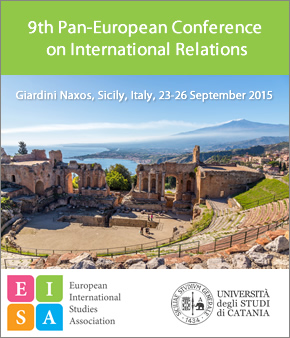
© EISA 2015
At the 9th Pan-European Conference on International Relations: The Worlds of Violence, organized by the European International Studies Association (EISA) in cooperation with the University of Catania, taking place from Wednesday 23 to Saturday 26 September 2022 in Giardini Naxos, Sicily, many members of the “International Dissidence” research group will present insights into their ongoing research. Nicole Deitelhoff, leader of the project on Protest in the Alter-Globalisation Movement and co-leader of the project on Transnationalisation of Rule and Resistance, and Donatella Della Porta of the EUI/ SNS Florence have organized and are chairs of Section S35: Political Violence and Resistance. The section brings together contributions from Political Sociology, History and International Relations to discuss the meaning, causes and consequences of political violence and resistance. On Thursday afternoon, Janusz Biene, Daniel Kaiser and Holger Marcks (of the project on Transnational Escalation) will present the paper “Brothers in Arms: Transnational Dynamics of Violent Dissidence” on a panel on Transnational Dynamics of Political Violence and Resistance chaired by Donatella Della Porta that also includes presentations by Eric Sangar, Maeva Clement, Thomas Lindemann, Jeffrey Checkel and Holger Osterrieder (TC35, Thursday, 2:30pm, Affreschi, ATA Hotel). On Friday morning, Christopher Daase, leader of the project Transnational Escalation and co-leader of the project on the Transnationalisation of Rule and Resistance, will be chairing and discussing a panel on “Law, the State, and Resistance” featuring presentations by Eva Dingel, Marie-Louise Glebbeek, Denise Vitale and Dirk A. Kruijt and Kees C. Koonings (FB 35, Friday, 11:15am, Stromboli, ATA Hotel). On Friday afternoon, Ben Kamis, (project on the Transnationalisation of Rule and Resistance), will present a paper titled “Law between the Keyboard and the Sword: an analysis of the reification of violence in European Cyberlaw” on the panel Epistemologies of Violence and the Force of Law chaired by Robert James Knox and including presentations by Susanne Krasmann, Christine Hentschel, Marieke de Goede, and Philip Liste (FD 28, Friday, 4:45pm, Stampa A/B, ATA Hotel). Also on Friday afternoon, Nicole Deitelhoff will chair and discuss a panel on “Violence and Mobilization” with papers by Francis Patrick O’Connor, Juan Masullo Jimenez, Oscar Berglund, Enzo Nussio, Juan E. Ugarriza and Corinna Jentzsch (FD35, Friday, 4:45pm, Affreschi, ATA Hotel). On Saturday morning, Priska Daphi, researcher in the project on Protest in the Alter-Globalisation Movement, will chair and discuss a panel on “Repression and Protest” with presentations by Ali Bilgic, Esin İleri, Nezihe Başak Ergin, and Jenny Louise Barrett (SA 35, Saturday, 9:00am, Affreschi, ATA Hotel). During the same time on Saturday morning, Jannik Pfister (working in the project on the Transnationalisation of Rule and Resistance) will present a paper on “The production of (in)security in protest policing. Normal bureaucratic rule on a transnational level” on the panel Security Professionals, Technocratization and the Politicsof (In)Security chaired by Andrew Neal, among presentations by Matthias Leese, Anthony Amicelle, Julien Jeandesboz, Dagmar Rychnovska, and Ozlem Kayhan Pusane (SA 38, Saturday, 9:00am, Polanyi 4149, Hilton). Also in the same slot, our colleague Sebastian Schindler will present on “The Critique of Power Politics in the United Nations: Origins and Consequences” (Panel SA 41: The Power Politics of International Organizations chaired by Gunther Hellmann, Saturday, 9:00am, Linosa, ATA Hotel, with further presentations by Joakim Ulstein, Ole Jacob Sending, and Steven Michael Ward). And last but not least, later on Saturday both Felix Anderl and Priska Daphi from the project on Protest in the Alter-Globalisation Movement and our colleague Maik Fielitz will present on the panel Causes and Effects of Radicalization, chaired by Andreja Zevnik. Felix and Priska will talk about “Radiicalization and deradicalization in the Global Justice Movement: From external factors to internal dynamics”, and Maik’s paper is titled “Sparks of dissidence. Tipping points in resistance against technoindustrial projects in Europe”. The panel also includes presentations by Mona Lilja and Mikael Baaz as well as Selin Bengi Gumrukcu (SB35, Saturday, 11:15am, Affreschi, ATA Hotel). Come meet us at the EISA conference! We are looking forward to enriching discussions.
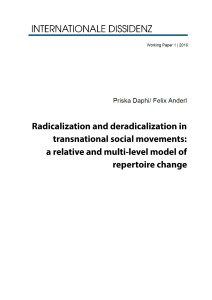 While repertoires are a common concept in social movement studies, little is known about how changes in repertoires occur. When do activists change protest tactics? Why do some innovations stick and others do not? This conceptual paper proposes a relative and multi-level approach to analysing changes in repertoires addressing shortcomings in existing research on radicalization and social movement repertoires. Focussing on transnational activism we propose, on the one hand, to define radicalization and deradicalization as processes of change relative to existing repertoires, which do not necessarily include violence. On the other hand, we argue drawing on examples from the Global Justice Movement that these processes are crucially shaped by the interplay of different factors at the local, national, and transnational level. Processes of radicalization and deradicalization depend on the combination of factors such as opportunity structures, protest cycles, relational dynamics, and political learning at these three levels.
While repertoires are a common concept in social movement studies, little is known about how changes in repertoires occur. When do activists change protest tactics? Why do some innovations stick and others do not? This conceptual paper proposes a relative and multi-level approach to analysing changes in repertoires addressing shortcomings in existing research on radicalization and social movement repertoires. Focussing on transnational activism we propose, on the one hand, to define radicalization and deradicalization as processes of change relative to existing repertoires, which do not necessarily include violence. On the other hand, we argue drawing on examples from the Global Justice Movement that these processes are crucially shaped by the interplay of different factors at the local, national, and transnational level. Processes of radicalization and deradicalization depend on the combination of factors such as opportunity structures, protest cycles, relational dynamics, and political learning at these three levels.

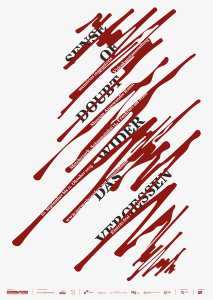 Within the series of events that make up the scientific-artistic project “Sense of Doubt. Resisting Oblivion” organized by the
Within the series of events that make up the scientific-artistic project “Sense of Doubt. Resisting Oblivion” organized by the 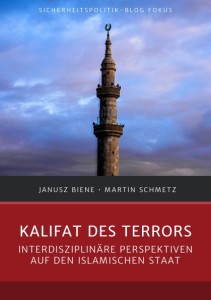
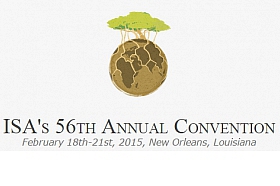
 Today an series of guest posts in the sicherpolitik blog has started that offers interdisciplinary perspectives on the “Islamic State: Caliphate of Terror”. The blog forum, organized by Janusz Biene (researcher in the Dissidenz project on “Transnational Escalation Mechanisms of Violent Dissidence”), will over the next weeks bring together 25 expert views on the dynamic development of ISIS, its origins, ideology, and possibilities for intervention, and discuss them on the blog.
Today an series of guest posts in the sicherpolitik blog has started that offers interdisciplinary perspectives on the “Islamic State: Caliphate of Terror”. The blog forum, organized by Janusz Biene (researcher in the Dissidenz project on “Transnational Escalation Mechanisms of Violent Dissidence”), will over the next weeks bring together 25 expert views on the dynamic development of ISIS, its origins, ideology, and possibilities for intervention, and discuss them on the blog.


